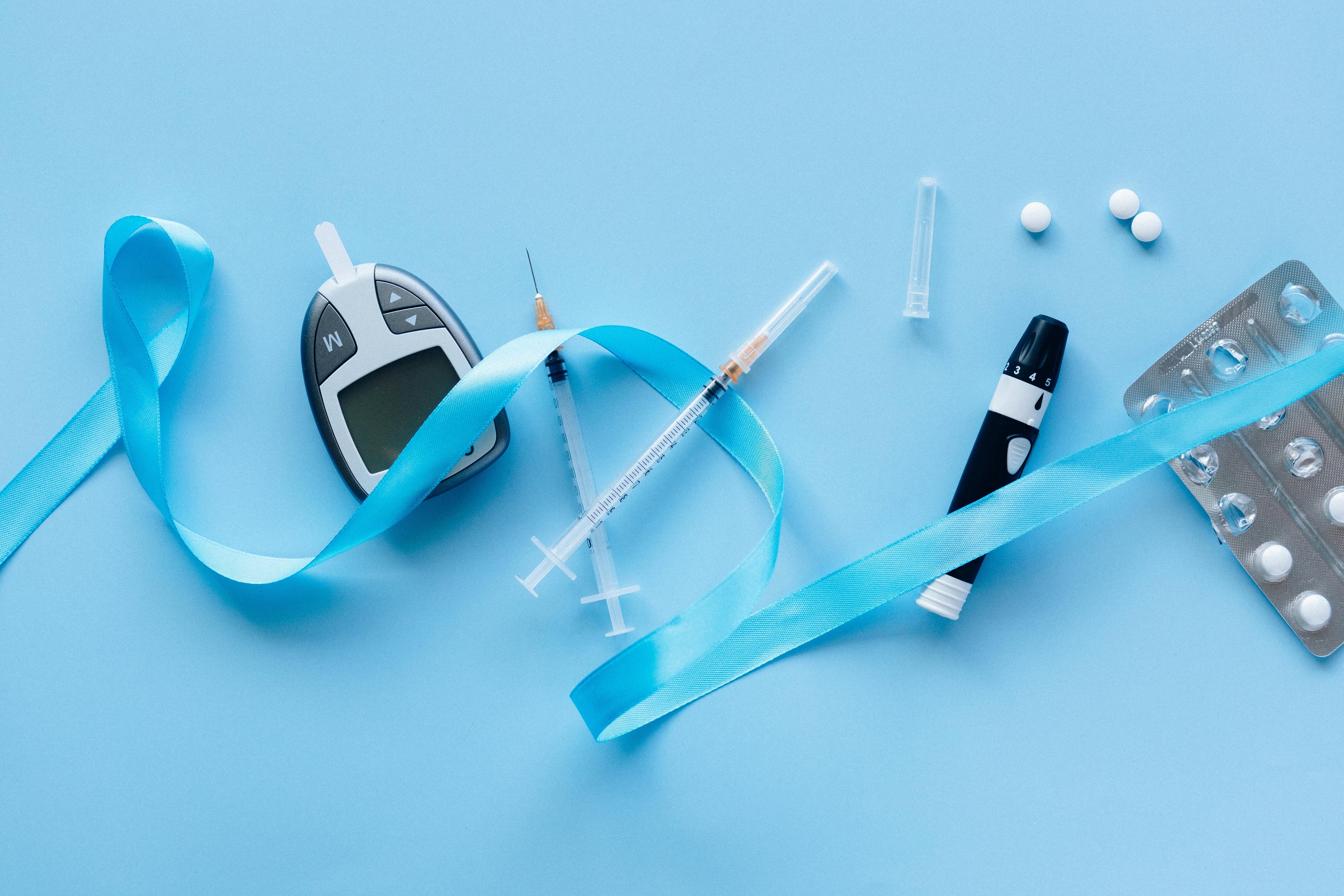

Living with diabetes means keeping track of various things such as your blood sugar, your meals and your energy levels. But something that often gets overlooked is how diabetes can affect your period.
Many people don't realise that fluctuating hormones and insulin levels can seriously impact your menstrual cycle and lead to irregularities, heavier bleeding, or more intense cramps.
In this blog we break down how diabetes and menstruation are connected, and what you can do to better manage both.
How are periods affected by blood sugar and hormonal changes?
One of the menstrual complications in diabetic women include fluctuations in hormones such as estrogen and progesterone, that directly affects insulin sensitivity.
This means that hormonal changes in diabetes and periods can lead to blood sugar spikes or dips, depending on the phase of the cycle.
For some, blood glucose levels may spike before a period starts, and then normalise once menstruation begins.
What is the connection between irregular periods and diabetes?
High blood sugar levels over time can interfere with ovulation, which in turn can make your menstrual cycle irregular.
There may be other reasons for late periods, but poorly managed diabetes, especially Type 1 or an uncontrolled Type 2, has been linked with menstrual irregularities such as skipped periods or longer cycles.


How are diabetes and menstrual disorders related?
The most common period problems in diabetes are heavy bleeding, severe cramping, or missed periods. This could be due to how diabetes affects blood flow, inflammation, or the overall balance of hormones.
Diabetes and menstrual cycle changes can also show up as earlier onset of menstruation during puberty or earlier menopause.
How does diabetes affect menstrual flow?
Changes in insulin sensitivity and blood sugar levels can impact how heavy or light your period is. Diabetes and heavy periods is a commonly reported issue, particularly in women who have had diabetes for several years.
On the other hand, some may experience lighter or shorter periods depending on how well their glucose levels are managed.


What effect can diabetes have on fertility?
There is a strong link between diabetes and women's reproductive health. Chronic high blood sugar can lead to complications like polycystic ovary syndrome (PCOS), and affect your ovulation. You can read more about PCOS here. This follows into fertility issues, as irregular ovulation or hormonal imbalances can make conception more difficult.
Can insulin resistance worsen premenstrual symptoms?
For many, period pain and diabetes go hand-in-hand. Neuropathy or nerve sensitivity caused by diabetes can intensify menstrual cramps. Additionally, premenstrual symptoms like fatigue, mood swings, or food cravings may feel more pronounced due to fluctuating blood sugar.
For example, high blood sugar levels can make period pain worse by increasing inflammation, and diabetic neuropathy (nerve sensitivity) might make cramps feel sharper or harder to manage.
Food cravings in the premenstrual phase can also impact glucose control, especially if you’re already working to balance your insulin or dietary intake.
What are the key tips for managing periods with diabetes?
Understanding the link between diabetes and hormone regulation is crucial for effective management.
Tracking your cycle and symptoms can help anticipate changes in blood glucose. Some people notice higher glucose levels in the luteal phase (the second half of the cycle), while others might experience unexpected lows during their period.
Adapting insulin doses or meal plans around your cycle may help stabilise levels.
Pairing your glucose monitor with a period tracker can help you spot patterns you might otherwise miss.
Apps like the Asan Period Tracker are designed to help with tracking your moods with different phases of your cycle.
How does diabetes affect menstrual health over time?
From puberty to menopause, diabetes and menstrual health go through significant shifts. Diabetes and menopause transition can result in unpredictable periods, worsened hot flashes, and increased risk of osteoporosis.
At puberty, young people with diabetes may face delayed menstruation or irregular cycles.
Make sure to talk to your doctor to adjust treatment plans accordingly!


Is your period moodier with diabetes?
The emotional toll of diabetes often intersects with menstrual health. Stress, fatigue, and hormonal fluctuations can take a combined toll on mental health and physical well-being, making diabetes-related menstrual problems even more challenging.
For some, it means intensified mood swings or feelings of anxiety and irritability. While for others, it might look like complete exhaustion or feeling off without being able to point out why.
Whether it’s adjusting your meals, speaking with your doctor, or simply tracking how you feel each day, small steps can help you better support your body through balancing your diabetes and menstruation.
Frequently asked questions
How does diabetes affect your period?
How diabetes affects your period depends on how well your blood sugar is managed. Poor control can lead to irregular, heavy, or missed periods.
Can diabetes cause changes in menstrual flow?
Yes. Diabetes and menstrual flow are closely related. Women may experience heavier or lighter bleeding depending on blood sugar levels.
Are fertility issues common in diabetic women?
Yes, there is a connection between diabetes and fertility issues. Hormonal imbalance or ovulation problems can make it harder to conceive.
What are some ways to manage menstrual issues with diabetes?
Effective diabetes care includes tracking your cycle, adjusting medication as needed, and maintaining a balanced diet to support both hormone and glucose regulation.
When should I visit a doctor?
If you notice persistent changes in your cycle or experience severe symptoms, it's important to consult a doctor. Keeping an open dialogue about the effects of diabetes helps improve your quality of life and ensures both your hormonal and glucose levels are in sync.
Want to stay on top of your menstrual health?
-

The App Store
Click to download -

Playstore
Click to download
More Posts
View all-

Is it safe to take period delay pills?
Thinking of delaying your period? This guide explains how period delay pills work, what to watch out for, and how tracking your cycle can make planning easier.
Is it safe to take period delay pills?
Thinking of delaying your period? This guide explains how period delay pills work, what to watch out for, and how tracking your cycle can make planning easier.
-

What are the stages and symptoms of menopause?
Menopause is a natural transition, but it can bring a mix of changes to your body and mind. This blog covers the stages, common symptoms, and simple tips to help...
What are the stages and symptoms of menopause?
Menopause is a natural transition, but it can bring a mix of changes to your body and mind. This blog covers the stages, common symptoms, and simple tips to help...
-

How to track your menstrual cycle with a period tracking app
Still counting days on your fingers to guess your next period? A period tracking app can change that. From predicting your cycle to spotting patterns in your mood, energy, and...
How to track your menstrual cycle with a period tracking app
Still counting days on your fingers to guess your next period? A period tracking app can change that. From predicting your cycle to spotting patterns in your mood, energy, and...
-

Can you use a menstrual cup if you have PCOD?
Curious how PCOD affects your cycle, fertility, and hormones? This guide breaks it down simply, plus tips on managing symptoms and using menstrual cups.
Can you use a menstrual cup if you have PCOD?
Curious how PCOD affects your cycle, fertility, and hormones? This guide breaks it down simply, plus tips on managing symptoms and using menstrual cups.






